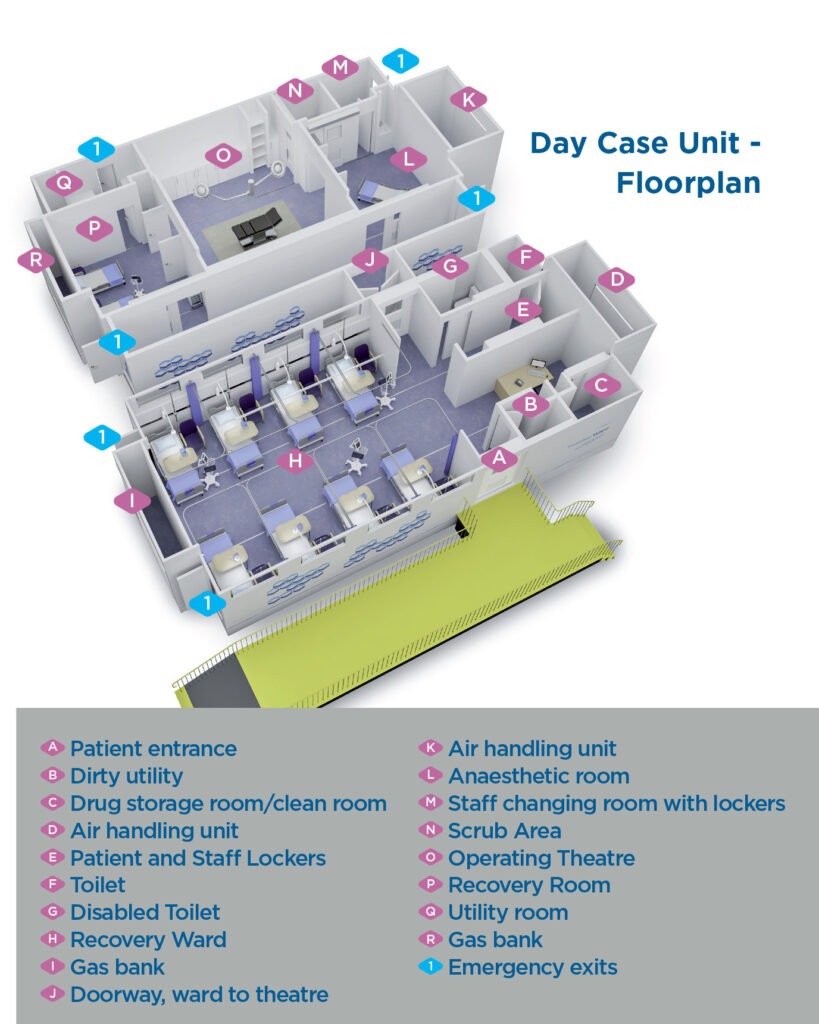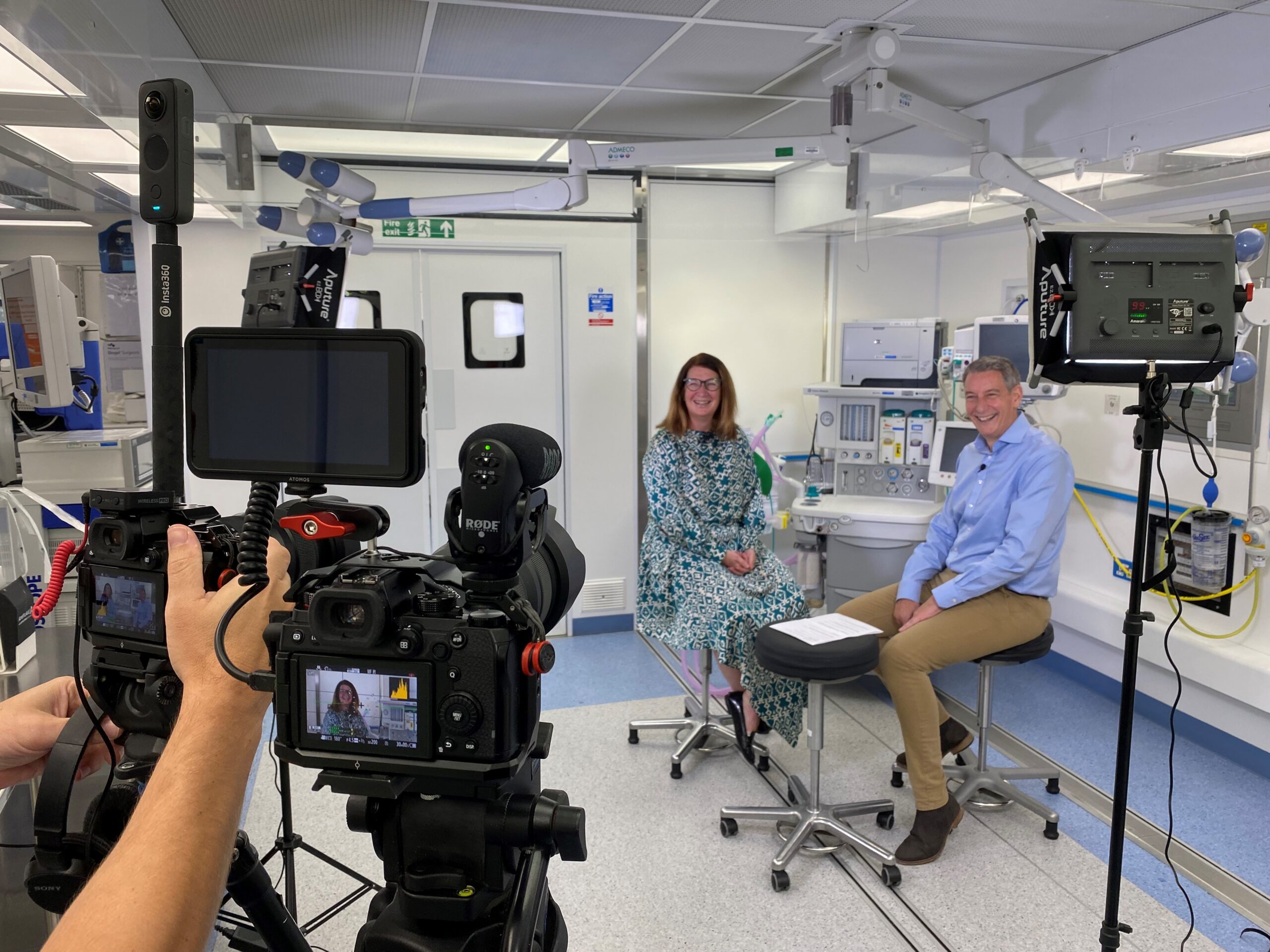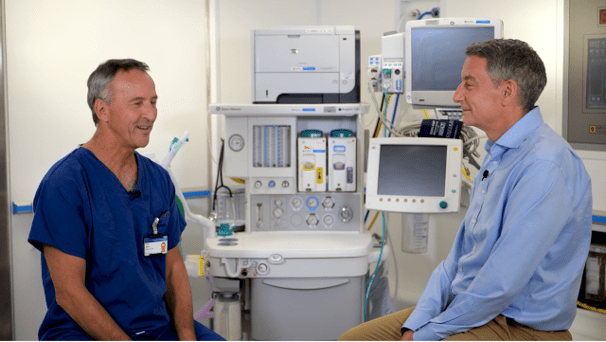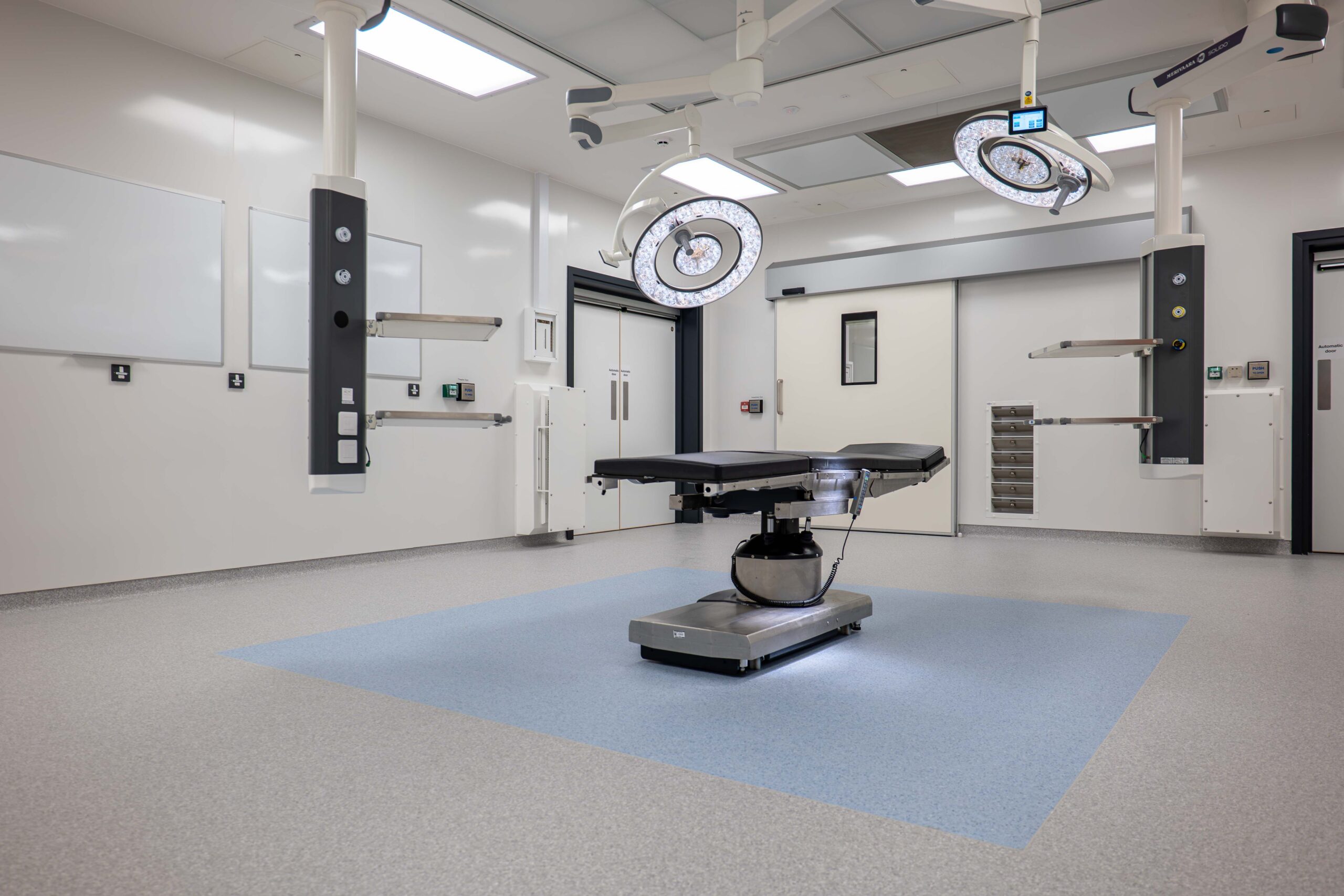It looks like you are in the United States
We have a different site (www.q-bital.com) which better suits your location
The day case facility is formed by the seamless joining of a mobile operating theatre and a mobile ward. A Vanguard clinical team supports the surgeons and anaesthetists, maximising efficiency and optimising patient experience.
Watch the interview or read the transcript, below.
For greater insight, there is a case study, here
An interview with Claire McGillycuddy, the trust's Associate Director of Operations for Surgery & Elective Care, can be watched, here
Chris:
Hi, Hamid. Really good to talk to you today. You've had the Vanguard unit on site for just over three months, now. It would be really good to hear from you how it's going, how you’re finding it and how the surgical team are finding it.
Hamid:
Well, just to introduce myself, I'm Hamid. I'm one of the anaesthetists, and I'm a medical director in planned care. I've worked on the unit, so I can tell you from personal experience, over the three months, we've had a gradual improvement in our working capacity in the Vanguard (theatre). It's been a fantastic experience for everybody concerned; the surgeons and anaesthetists who have worked there, me being one, have really enjoyed the experience. It's taken us out of main theatres. It's a very quiet environment, very peaceful in there. It feels very secluded but, in some ways, it's very good in terms of us accessing our patients and having good patient experience. And the patients have been very well looked after.
Chris:
Excellent. You alluded to it there, a little bit, but it'd be really interesting, just in terms of how different it is from your usual theatres and usual operating environment…
Hamid:
Yes. So, it is different in the sense that it's a mindset thing, in that you're in the Vanguard, not in our main theatres. It is a normal theatre environment so all the equipment is exactly what we would expect to have in a normal theatre, both surgical and anaesthetic. As an anaesthetist, we go in there as a pair. We have two people there every day and you know that you're going to be there all day. So, you've set out your routine for the day, you've met your patients, and you focus on just the patients that you are going to look after that day. Unlike in the main theatre, where you can be disturbed by lots of different influences.
Chris:
So, just going back to the decision-making process that you would have gone through and the various options that were on the table for you, it'd be really good to understand, from a clinical and medical perspective, why you felt the Vanguard unit was the best solution for you?
Hamid:
Yeah, that's a very good question. So, our big pinch point has been theatre capacity. Clinically, we are very aware that our patients are waiting longer than they should be waiting. We looked at many options to try and understand how we can introduce that capacity. But really, ultimately, it was a clinical discussion with the management team who were very supportive about the fact that we needed to extend and increase our theatre capacity, in order to bring the long waiting times down for our patients, and that was well received. It went through the proper channels in terms of discussions at the executive level, and it was felt that the clinical importance of this should not be overlooked and should be paramount, and on that basis, we came to the decision to bring the Vanguard team into Milton Keynes Hospital.
Chris:
That's really interesting and really good to hear that it was the clinical team that identified the need here and then worked closely with the management team to drive that through. That sounds like the case.
Hamid:
Yeah, very much so. The management team, the executive team challenged us, as the clinical team to understand what the options were. We went through many different options, including, working at weekends, which we are doing currently and have been doing for some time, but we, the clinical team, felt that there needed to be an increase in our theatre capacity to try and bring those waiting times down. And that's what we are being successful in doing.
Chris:
And you talked previously, around the fact that you started relatively slowly, and then over time it's built up. So, it sounds like you're becoming more efficient through the unit. So, it would be good to understand, given efficiency is quite a big driver at the moment, how you're moving that efficiency side of things forward.
Hamid:
That’s a good question because there're different aspects to efficiency. There is the human factors aspect, which I'll come to, and then there's the operational aspect. So, the human factors; we clearly started off as two separate teams. There’s a Vanguard team who work in theatre, and there's our day surgery team which are part of our hospital and then there's a surgical and anaesthetic team, which are also part of MKUH, and we got to know each other.
That takes a little bit of time. We got to know how each other work, our expectations from each other. I have to say, my understanding and my knowledge of the Vanguard team are that they're extraordinarily professional, which was great to see. And as that team ethos built, we became more efficient as we understood how each other worked.
And in the operational side of things, it's about making sure that we had the right kit in place, the right disposables in place, making sure that HST was managing our equipment, so that the next day we had the right equipment again. And so the throughput improved as we got these processes better developed.
Chris:
Could you just talk me through the sort of activity that you're doing on the unit and the specialisms that you're working through?
Hamid:
Yes. So, the first thing to say is it's all day case. That's great because we are just focused on a specific kind of patient. There tend to be ASA 1 or 2 patients, and we use the Vanguard for a variety of specialties in order to make sure we maximize its use and make sure our efficiencies are therefore maximized. And they would be general surgery, orthopaedics, some urology, and some dental patients.
Chris:
And in terms of how you would see that evolving over the next few months, is there a specific route through? My sense is that you're making some really good inroads into the waiting lists that you have, and therefore, there will be other elements, I guess, that will, all of a sudden, start to look like new challenges. So, how would you see it evolving over the next few months?
Hamid:
Yeah. So, I think again, you hit it on the head, there. It's an evolving picture. We started off with specialties that we had the highest patient waiting times for, and we tried to make sure we reduced those patient waiting times as quickly as we could. Then, as other pinch points arise, we will clearly be agile to try and coordinate such that we would change the specialties to try and always get the best care for the patients, which are the patients that are waiting the longest time, and make sure that we change things accordingly to reduce those waiting times across the board, rather than just specifically in the specialties I mentioned.
Chris:
You've got the standalone Day Case Unit, with the ward and the mobile theatre, which brings additional capacity, but also, by moving patients out from the traditional theatres, that frees up additional slots there, as well. So, it'd be good just to hear how you're using that additional capacity across both your existing theatres and the Vanguard one, and how you're planning and managing that through.
Hamid:
Yeah. So again, the fundamental reason why we have the Vanguard in place is to increase our theatre capacity, which has always been a pinch point. So, we are utilizing the Vanguard. The patients that are coming through there are on the same pathway that they would normally be. So, they come to our day surgery unit, get admitted there, and reviewed there and then they get brought to the Vanguard unit and then will be in the Vanguard unit for their recovery and then home. So that removes a burden of patients, if you like, a burden of work from the existing theatre teams, and then we backfill into our empty theatres or vacant theatres with other specialties or other long waiting patients or indeed, other cancer patients that are also waiting.
Chris:
You talked about the patients there, and there's always a little bit of a fear when we first start to talk to clinicians and senior leaders within NHS trusts, that the patient experience (in a mobile facility) may not be quite the same, and it would be good to hear from you how patients have found being on the unit.
Hamid:
So, the patient experience, from the patients that have fed back to us, has been excellent. They've really enjoyed the Vanguard unit. They've enjoyed the fact that, they're getting their operations much earlier than they otherwise might have done and also, the staff, both the day surgery staff as well as the Vanguard team are, as I've said already, highly professional, really focused on patient safety and patient experience and they provide a really good experience for these patients. So, the overwhelming experience has been very positive.
Chris:
I think there's always the danger of talking about patient numbers and waiting list reductions, rather than thinking about the human stories that then sit behind that. So, it would be good to hear your sense of how patients are benefiting from having additional capacity and having the unit here.
Hamid:
Yes. So, the fundamental reason why we exist, why we are here in the hospital, is about patients. And we look after our patients to the best of our care. Clearly there is capacity constraint, which was our theatre capacity. We've improved that with the access to the Vanguard unit.
Every single patient has a story and that's why they are a patient, and so we try and make sure that every single patient has the individual care that they deserve. But the important thing here is that we are now doing it much earlier. They are not having to wait so long.
Chris:
And, final question, in your capacity as a medical director, how would you view the key measures of success? What is it, at the end of it all, that would give you that indication that this has been a very successful venture for you?
Hamid:
I'd break that down into operational and patient centred, metrics. The operational metrics are very clear. We need to reduce waiting times for our patients and we are doing that through the increased capacity that we've had with a Vanguard unit. The patient metrics are slightly more nebulous but equally, if not more, important and they are about patient experience and patient safety. We're making sure that we deliver the safest care we can and the patient is getting a fantastic experience. Fundamentally for them, they're getting their procedures done earlier, much earlier, than they otherwise would have. So, they are very, very happy about that.
Chris:
Excellent. Well, from my perspective, it's been amazing for the Vanguard team working with your team at the Milton Keynes University Hospital Trust and we've loved every minute and really are enjoying supporting you.
Hamid:
Thank you very much, and we feel very supported. I think it's very important I say that. I've already mentioned it before, but I would do a big shout out to the Vanguard team. I've worked with them myself. They are very professional, very focused on patient care, very focused on patient safety, and it's been a real pleasure to be part of that unit.
Chris:
That's really good to hear. Thank you.
Hamid:
Thank you.




Vanguard Healthcare Solutions
Unit 1144 Regent Court, The Square, Gloucester Business Park, Gloucester, GL3 4AD

We have a different site (www.q-bital.com) which better suits your location